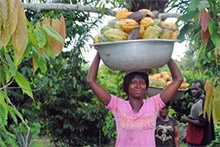Brussels Briefing No. 44: Promoting responsible and sustainable sourcing through Fair Trade
 Brussels, 20 June 2016/ CTA/ ACP:An estimated 500 million small-scale farmers and one billion agricultural workers supply 70% of the world’s food. Numerous studies have shown that smallholder farming is the most sustainable and environmentally-friendly way of farming. Yet small-scale farmers are often-forgotten actors in the supply chain, and are the ones to suffer the most from Unfair Trading Practices.
Brussels, 20 June 2016/ CTA/ ACP:An estimated 500 million small-scale farmers and one billion agricultural workers supply 70% of the world’s food. Numerous studies have shown that smallholder farming is the most sustainable and environmentally-friendly way of farming. Yet small-scale farmers are often-forgotten actors in the supply chain, and are the ones to suffer the most from Unfair Trading Practices.
In parallel, workers on farms and in factories are also among the most vulnerable people in global trade. Fundamental rights at work are frequently violated in the agricultural sector. Workers often lack formal contracts, freedom of association, basic health and safety assurances, and adequate wages, among other challenges.
Fair Trade, which is a ‘trading partnership, based on dialogue, transparency and respect that seeks greater equity in international trade’, has set a model that can ensure that global supply chains work for the benefit of small-scale farmers and thus contribute significantly to sustainable supply chains and the alleviation of rural poverty and to rural development.
It contributes to sustainable development by offering better trading conditions to, and securing the rights of, marginalized producers and workers – especially in the South. The fair trade movement represents an international network of 2.5 million fair-trade producers and workers from 70 countries, and more than 100,000 volunteers.
The next Brussels Briefing, No. 44 in the series, will address issues relating to promoting responsible value chains and sustainable sourcing through fair trade in the agricultural sector. The Briefing will take place on 22 June 2016 from 9:00 to 13:00 at the ACP Secretariat in Brussels, Belgium, jointly organised by CTA, the European Commission/DEVCO, the ACP Secretariat and the Fairtrade Foundation.
Targeting around 120 ACP-EU policy-makers, civil society groups, research networks, development practitioners and international organisations based in Brussels, it will focus on promoting responsible value chains and sustainable sourcing through Fair Trade. The event also aims to highlight the problems that are currently making value chains unsustainable, in particular in the sourcing phase. The briefing will conclude with a reflection on how sustainable sourcing could be promoted, in particular through Fair Trade.
Outputs Input and comments before, during and after the meetings will be included in the Briefings Website: http://brusselsbriefings.net . A short report and a Reader in printed and electronic format will be produced shortly after the meeting.
Below is a summary of the programme. For more information and to register, visit: http://brusselsbriefings.net.
- Register to participate
- Read theprogramme
- Read thebackground note
- Follow@CTAflashand@CTAbrusselson Twitter for regular updates
